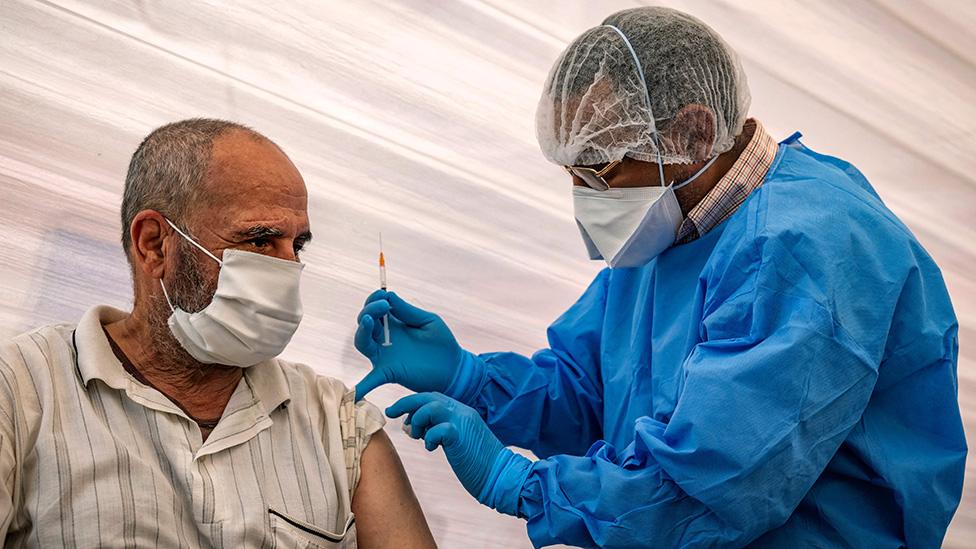Covid in Scotland: Global vaccination should be 'focus' over teenagers
- Published
Covid in Scotland: 'Vaccinating the world protects against variants'
Scotland should focus on the "huge gap" in global vaccine roll-out before vaccinating teenagers, a public health expert has said.
Linda Bauld, professor of public health at the University of Edinburgh, said she hoped the UK would "step up" to donate vaccines to poorer countries.
The UK regulator approved use of the Pfizer-BioNTech vaccine in children aged 12-15 on Friday.
First Minister Nicola Sturgeon said the news made her "heart sing".
However, Ms Sturgeon added at her Friday Covid briefing that Scotland would wait for advice from the Joint Committee on Vaccination and Immunisation, and would also need to consider supply implications.
More than 3.3 million people aged 18 or over in Scotland have so far received a first dose of a Covid vaccine, with about 2.2 million now fully vaccinated.
The MHRA said on Friday it had carried out a "rigorous review" of the vaccine in adolescents. The UK's vaccines committee will now decide whether children should get the jab.
But Prof Bauld told BBC Scotland's The Sunday Show that a decision to vaccinate teenagers in Scotland could be "controversial" globally.
"[With] the huge gap in the vaccine roll-out around the world, many people, including some of my colleagues, are saying let's not press ahead with this. Let's focus on helping out low and middle-income countries. So we wait to see what the decision is."

Vaccination programmes in many countries around the globe are far behind the UK's roll-out
Prime Minister Boris Johnson is due to urge leaders of other wealthy countries to commit to vaccinating the world against Covid-19 by the end of next year.
He will lay out a target for global vaccination at a summit of the G7 group of advanced economies on Friday.
Children and teenagers are at a much lower risk of becoming seriously ill from Covid-19, though can still pass on the infection.
'Escaped mutant'
Prof Bauld said there were good reasons for vaccinating 12-15 year olds as "well over" 80% of the population needed to be vaccinated to achieve "population immunity" against Covid-19.
But the professor told BBC Scotland that there were many countries around the globe where vaccination levels were low but cases were "skyrocketing".
She said that not addressing vaccine roll-out issues in countries with high levels of infection would curtail global travel in the future and lead to a much higher risk of dangerous variants emerging.
"Variants develop where there is infection," she said.
"If we want to protect ourselves against what we call an escaped mutant - a variant that really would challenge our vaccines - we need to reduce our infections around the world."

Scotland's national clinical director, Prof Jason Leitch, said there were 16,000 versions of the virus around the world - but only four variants of concern.
He told BBC Scotland it was crucial that the global vaccine programme moved as quickly as possible to guard against a variant which could defeat vaccination.
"So far the vaccine - particularly two doses of the vaccine - are successful for the variants we have, but eventually one will probably get away from us and we'll have to adjust the vaccines over time," he said.
"What we're trying to do is win the race now, get the incidence down around the world, not just in Scotland, and then the vaccine scientists can work on a new vaccine for us as they monitor the virus around the world."
A Scottish government spokesperson said: "We are providing the vaccine to people on a priority basis as set out by the independent expert clinicians and scientists on the Joint Committee on Vaccination and Immunisation (JCVI).
"Covid vaccines are procured by the UK Government on a four-nations basis, so any decisions on supplying doses to other countries is a matter for UK ministers. However, we recognise the importance of other countries having a strong supply of the vaccine, and will continue to work with the UK Government to explore how best to support global supply through the Covax scheme."

